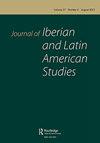“没有自由就没有荣誉”,也没有民主。古巴,19世纪西班牙帝国的奴隶制和废奴主义
IF 0.3
0 HUMANITIES, MULTIDISCIPLINARY
Journal of Iberian and Latin American Studies
Pub Date : 2020-05-03
DOI:10.1080/14701847.2020.1789377
引用次数: 0
摘要
在19世纪的西班牙帝国,民主思想被用来使废除和保留奴隶贸易和奴隶制的需要合法化。本文将展示西班牙政治辩论中“奴隶制”与“民主”之间的关系是复杂且不断变化的。对于政治行动者来说,在不同的意识形态范围内,民主思想既被认为与奴隶制不相容,又被认为是反对废除奴隶制的理由。本文章由计算机程序翻译,如有差异,请以英文原文为准。
“Without liberty there is no honour”, nor democracy. Cuba, slavery and abolitionism in nineteenth century Spain’s empire
ABSTRACT Democratic ideas were used to legitimize both the need to abolish and to preserve the slave trade and slavery in the Spanish empire during the nineteenth century. This article will demonstrate that the relationship between “slavery” and “democracy” in the Spanish political debate is complex and changing. For political actors, on various places of the ideological spectrum, democratic ideas were presented both as incompatible with slavery and as a reason to oppose its abolition.
求助全文
通过发布文献求助,成功后即可免费获取论文全文。
去求助
来源期刊

Journal of Iberian and Latin American Studies
HUMANITIES, MULTIDISCIPLINARY-
CiteScore
0.40
自引率
33.30%
发文量
23
 求助内容:
求助内容: 应助结果提醒方式:
应助结果提醒方式:


